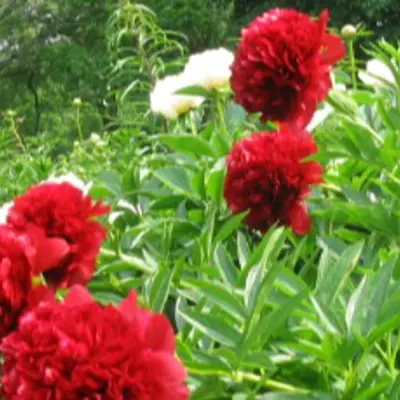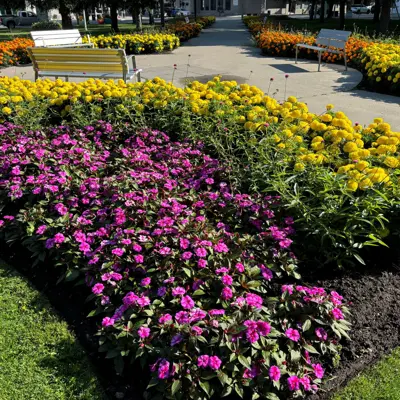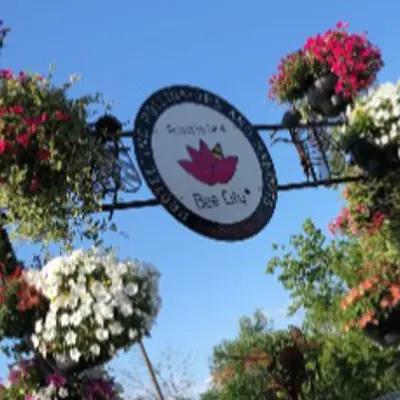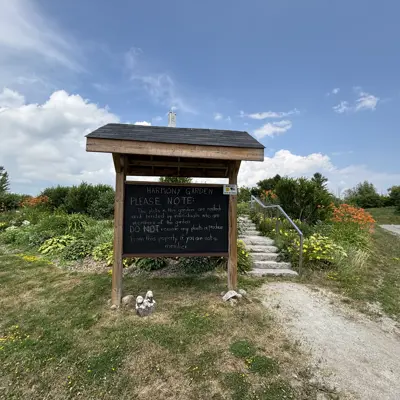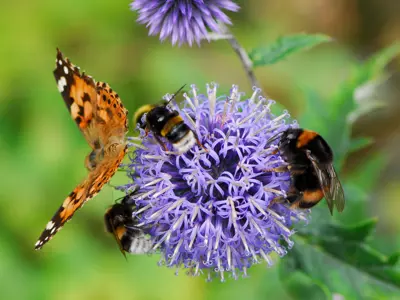| Botanical name | Common name |
|---|---|
|
Asclepias tuberosa |
Butterfly Milkweed |
|
Achillea millefolium |
'Saucy Seduction' Yarrow |
|
Aster novae-angliae |
'Vibrant Done' New England Aster |
|
Bouteloua curtipendula |
Side Oats Grama |
|
Echinacea x |
'Hot Coral' Hot Coral Echinacea |
|
Echinacea x |
'Flamenco Orange' Flamenco Orange Echinacea |
|
Echinops ritro |
'Veitch's Blue' Globe Thistle |
|
Elymus canadensis |
Canada Wild Rye |
|
Hemerocallis |
'Happy Returns' Daylily |
|
Hemerocallis |
'Tigger' Daylily |
|
Kniphofia |
'First Surise' Red Hot Poker |
|
Lavandula angustifolium |
'Munstead' Lavander |
|
Leucanthemum superbum |
'Becky' Shasta Daisy |
|
Liatris spicata |
Blazing Star |
|
Lobelia siphilitica |
Great Blue Lobelia |
|
Monarda didyma |
'Purple Rooster' Bee Balm |
|
Nepeta faassenii |
'Walkers Low' Catmint |
|
Oenothera fruiticosa |
'Glauca' Sundrops |
|
Pachysandra terminalis |
Japanese Spurge |
|
Rudbeckia fulgida |
'Goldstrum' Black-eyed Susan |
|
Salvia verticillata |
'Purple Rain' Whorled Sage |
|
Solidago sphacelata |
'Golden Baby' Goldenrod |
|
Sorghastrum nutans |
Indian Grass |
|
Tiarella cordifolia |
Foamflower |
Gardens
A community in bloom
Oshawa is proud of our award winning parks, gardens, and floral displays.
Floral displays and designOur gardens are a source of civic pride and recognition in our community and beyond. We have received provincial, national, and international honours from Communities in Bloom. |
Fun facts
- Flowers are grown from seed in our greenhouse before planting in the spring
- City staff design, plant, and maintain the flowerbeds
Watch for new themed plant and flower displays throughout the City.
Bee City
Bee City Canada has recognized Oshawa as a Bee City for our commitment to protecting pollinators and their habitats. We have five pollinator gardens and four community gardens containing pollinator plant species. Many of our other flowering gardens and baskets are a source of pollen for animals and insects.
Oshawa was one of the first cities in Canada to develop a pest management program before Ontario's cosmetic pesticides ban. Our Boulevard By-Law encourages pollinator plantings throughout the City. Our crews also incorporate no-mow or low-mow species as much as possible to increase naturalization of new and existing parks.
Common garden plants
Some common garden plants can have an invasive nature. Review the Ontario Invasive Plant Council’s Grow Me Instead P.D.F. to discover great alternatives to beautify your property.
Pollinator gardens
Oshawa is home to five pollinator gardens on City-owned land, including a pollinator garden and meadow at Delpark Homes Centre with native plants to attract birds, bees, and butterflies. These gardens support over 1,000 species of pollinators, crucial for seed and fruit production, which maintain ecosystems and food supplies. To combat pollinator decline, the City creates suitable habitats in its gardens.
Types of pollinator plants in City gardens
What you can do for pollinators
Rethink your lawn and garden routine by skipping mulching and tidying in the fall. Leave bare ground, berries, seed heads, leaves, twigs, dry stems, and dead branches to create habitat and shelter for wildlife during winter.
In the spring, delay garden clean-up until late spring or early summer to allow pollinators to emerge without disturbing their habitat. To create a pollinator-friendly garden, you can:
- Plant a succession of flowering plants to bloom from spring to fall
- Use a variety of native plants rich in nectar and pollen
- Provide shelter and nesting options, such as woody stems, bare ground, or bee-nesting houses and blocks
Resources
Contact Us
Service Oshawa
Oshawa City Hall
50 Centre St. S.
Oshawa, ON L1H 3Z7
Phone: 905-436-3311
Toll Free: 1-800-667-4292
Email: service@oshawa.ca
Get information from the source
Subscribe to City News and get the latest updates delivered to your inbox.

